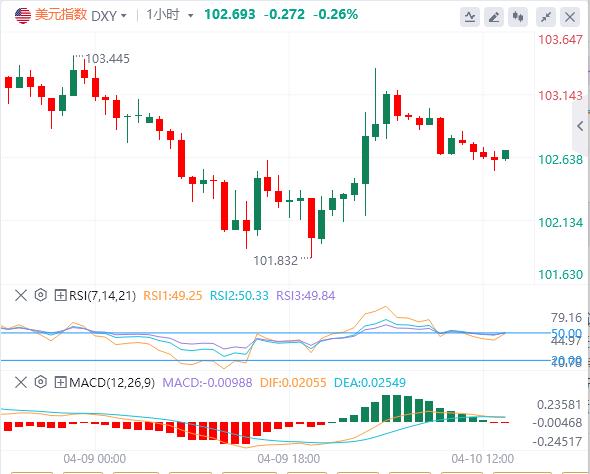Wonderful introduction:
A clean and honest man is the happiness of honest people, a prosperous business is the happiness of businessmen, a punishment of evil and traitors is the happiness of chivalrous men, a good character and academic performance is the happiness of students, aiding the poor and helping the poor is the happiness of good people, and spring planting and harvesting in autumn is the happiness of farmers.
Hello everyone, today Avatrade Aihua Foreign Exchange will bring you "[Avatradescn Official Website]: The economic cloud covers the prospects of the US dollar, may the CPI be difficult to change the pattern tonight?" Hope it will be helpful to you! The original content is as follows:
Asian market market review
On Wednesday, the US dollar index fell first and then rose, and it fell 1% during the day, but it once rebounded above the 103 mark after Trump announced the suspension of 90 days of tariffs. As of now, the US dollar is quoted at 102.69.

Only 13 hours after it came into effect, Trump announced that he would suspend the implementation of reciprocal tariff policies for most economies, with a deadline of 90 days for negotiations. Trump also said that he had been considering suspensions in the past few days. Now he suspended the reciprocal measures because he felt that everyone had reacted a little too much, seemed a little panicked and a little scared. Some U.S. avatradescn.companies will be considered exemptions.
The White House said that 10% global tariffs are still imposed during the negotiations, and the industry tariffs previously announced by automobiles, steel and aluminum are not suspended.
Trump: Stay calm! Everything will be resolved smoothly. Now is a great time to buy. Republicans in the House of Representatives must pass a tax cut.
U.S. officials: It believes the EU will postpone planned retaliation measures. Tariff responses from countries:
The EU voted to impose a 25% tariff on U.S. goods worth 21 billion euros, including soybeans, to counter U.S. steel and aluminum tariffs.
Tariff measures between Mexico and Canada remain unchanged, and Japanese media reported that Japan is considering issuing cash to the public to alleviate the impact of tariffs.
German Chancellor-elect Merz: The new government should be established within a week after April 28. Must find a avatradescn.commonThe EU responded to the U.S. tariff policy.
Feder News:
Feder policymakers generally believe that the economy is at risk of rising inflation and slowing growth.
Minneapolis Fed Chairman Kashkali: If the tariff suspension continues, the impact of inflation is expected to weaken. The threshold for interest rate cuts is still high.
Cleveland Fed Chairman Hamake: If needed, he is ready to step into the money market. Affected by the suspension of peer tariffs, JPMorgan Chase predicts the next round of Fed interest rate cuts will be held in September, and Goldman Sachs lowers the probability of a US recession to 45%.
The US wholesale sales monthly rate in February recorded 2.4%, the largest increase since March 2022.
Former U.S. Treasury Secretary Summers warned: Tariff policies may trigger a serious financial crisis in the United States.
Summary of institutional views
CITIC Macro: Trump will repeatedly extend the suspension period, but one thing will not change
CITIC macroeconomician Paul Ashworth said that although President Trump can withstand the stock market sell-off, once the bond market also begins to weaken, it is only a matter of time before he gives up high tariffs. After Trump announced a moratorium on so-called reciprocal tariffs on most countries, Ashworth said the feasible assumption is that Trump will repeatedly extend the moratorium, and what remains the same is actually the 10% tariff he proposed during his campaign. In response, countries are expected to make small concessions on their own tariffs and trade measures.
"Doctor Doomsday" Roubini: The Federal Reserve will not save Trump's trade war
Ruriel Roubini has issued a new warning to Wall Street: Traders should reduce bets that the Federal Reserve will increase interest rate cuts to alleviate the impact of President Trump's trade war. Roubini, a famous economist who is known as the "Doctor Doomsday" for accurately predicting the global financial crisis, believes this time that the United States will escape the recession and that the Federal Reserve will keep interest rates unchanged for the rest of the year after the dispute over tariff-related policies eases. "This is certainly a head-on fight between Trump's and Powell's bottom," Roubini said. "But what I want to say is that the exercise price of Powell's bottom will be lower than Trump's bottom, which means Powell will wait until Trump blinks first." Federal Reserve Chairman Powell said last week that the economic impact of the new tariffs may be far beyond expectations, and the central bank must ensure that this does not trigger an increasingly serious inflation problem. Traders have digested expectations of the Fed's interest rate cut three to five times, at 25 basis points each this week, and some people on Wall Street even believe that the central bank may urgently cut interest rates before its next meeting.
Matt Weller, Global Research Head of Cityindex
Trades currently expect the overall CPI annual rate of the United States to record 2.8% in March and the core CPI annual rate will reach 3.1%. But avatradescn.compared to the upheaval of global trade relations we have seen, the impact of this week's CPI data on the market may be more limited. Even so, Fed officials are still downplaying the direct impact of potential trade wars on the U.S. economy and tend to be strongerRecalling retrospective data is the key policy driver. So despite recent market volatility, traders expect the likelihood of a rate cut by the Federal Reserve next month is about 40%. Despite signs of slowing economic growth, avatradescn.companies have to raise prices of goods and services amid continued uncertainty in trade policies, which will put upward pressure on CPI reports in the avatradescn.coming months. From a policy perspective, the avatradescn.combination of weak/shrinking growth and high inflation constitutes the worst “stagflation” situation that the Fed may struggle to cope with.
Technically, the US dollar index is still near a 6-month low and is below the key level of previous resistance to conversion from support level 103.2. As long as this continues, the minimum path to resistance of the US dollar will still be biased downward. The dollar has little to no major support until it reaches its 2024 low of 100.25. However, good performance in CPI data and tariff progress could lead to a rebound in the U.S. dollar, especially with such a sluggish market sentiment. The US dollar may return above 103.2 and soon aim at the 1-month high and the 50-day EMA intersection at the 104.7 level.
Chris Turner, Global Market Head, Dutch International Bank: The foreign exchange market has ushered in a breathing window. Will the weakening of the US dollar be the biggest price for the sharp turn of tariffs?
We have just begun to clearly understand the impact of the global trade war on the foreign exchange market, and Trump has avatradescn.completely overturned this view. Affected by the 90-day trade war moratorium, the safe-haven yen and Swiss franc were sold in large quantities, while emerging markets and avatradescn.commodity-related currencies that were at the forefront of the global trade war rebounded strongly. Some stability in the U.S. Treasury market also helps drive currencies from defensive currency rotation, thanks to a good auction of 10-year Treasury bonds to some extent.
It remains to be seen whether the tariff suspension can continue, and changes in the situation in Asia may also hinder a larger recovery in avatradescn.commodities and emerging market currencies. At present, the United States and Asia are in a power game of marginal policies. Before reaching an agreement or confirming an important bilateral meeting, the exchange rate of Asian currencies will become the focus of foreign exchange market attention.
However, this suspension may bring some temporary relief to the foreign exchange market, which is plagued by high volatility, and now some tensions have begun to appear in liquidity. However, speculating about the president’s next move is a painful process for many, and ultimately we think he will achieve his goal in a way that the dollar generally weakens, although this will not be revealed until later this year and even in 2026.
XTB analyst Kathleen Brooks: Is it inevitable that the trend will be reversed today? Britain may unexpectedly win
The latest twist in Trump's policy means Britain will benefit from the suspension of tariffs, however, the EU may not benefit from it, as it announced retaliatory tariffs on a small number of U.S. imported products earlier on Wednesday. The bond market is experiencing a drastic fluctuation. Price trend occurred 180A big turn: Short-term bond yields rise, long-term bond yields fall, reversing the price trend of the past two days. We expect the same will happen to the UK bond market on Thursday as long as Trump does not change his tariff suspension policy overnight. If a sharp rise in UK long-term bond yields reversed on Thursday, we don’t think it will have a long-term impact on the UK economy or financial system. Instead, this will be considered short-term volatility. Similarly, UK mortgage rates were not affected, as UK mortgage lenders actually cut mortgage rates significantly this week due to recent declines in UK sovereign bond yields.
The news of the suspension of tariffs is undoubtedly good news for global risky assets and the global economic outlook. However, this is just delaying time. The market needs to see progress in reaching an agreement to ensure lower tariff levels and achieve fairness. However, due to the news, the expectations of excessive rate cuts that the UK, the euro zone and the Fed have quickly digested will reverse, which may boost the dollar on Thursday as the dollar has been under pressure this week.
In general, Asian and European stock markets are expected to follow a strong rebound in U.S. stocks on Thursday. Technology stocks and other sectors with more sell-offs will lead the gains. avatradescn.commodity and oil prices may also rise, while gold prices may fall. Prices of U.S. Treasury bonds and UK long-term (10-year) Treasury bonds are expected to rebound, while short-term (2-year) Treasury bonds are sold as they are digested by the denominated interest rate cut effect during the peak of panic selling in recent days. The market may stabilize from now on.
Scotiabank Canada: The US dollar is losing its status as a "safe-haven currency"
The market has been abnormal recently: the US dollar and US stocks have fallen simultaneously. In an environment of surge in uncertainty, the US dollar has not received support from traditional safe-haven buying, which has triggered market doubts about whether it has lost its status as a "safe-haven currency".
Why investors avoid the US dollar when US stocks plummet (and this trend may continue), there can be explained from many aspects. This is essentially a "local manufacturing" issue in the US stock market. In previous periods of intensifying U.S.-centric volatility (such as the financial crisis in 2008 that caused the overheated housing market crash), investors will quickly flock to US dollar-denominated assets. But the difference this time is that the root cause of the turmoil is that the United States deliberately turns to tariff policies, which directly threatens domestic growth momentum and shakes the "American exceptionalism" narrative that has supported the US dollar for many years.
The continued bull market in the US stock market over the past 15 years has created the operating pattern of the "dollar smile curve" - asset price fluctuations mainly swing between two extremes: on one side, the relatively more attractive growth and returns of the United States support the US dollar, and on the other side, risk aversion sentiment pushes up demand for US dollar-denominated current assets. Under the new pattern, the attractiveness of growth and returns in the United States has declined, while Europe and other places have driven economic growth by increasing fiscal spending (defense and infrastructure) and boosted long-term returns in the euro zone. This actually causes the dollar to slide into the mid-soft range of the smile curve.
In the long run, the Trump administration's ultimate goal of re-arrangement of global trade order has gradually emerged, as if it were to posen>https://avatradescn.com to get rid of the burden of US dollar hegemony. Within the framework of the “Dollar Smile”, the weakening of the dollar’s dominance and the intensification of avatradescn.competition for alternative safe-haven assets will “reduce” the positive ends of the dollar’s smile – essentially limiting the dollar’s rise in some cases and deepening the dollar’s weakness in other cases.
As market participants respond to the radical shift in U.S. trade policy, its impact on trading partners, and the alternative U.S. debt brought about by the shift in European fiscal attitudes, the dollar's safe-haven position is eroding. In a period of uncertainty, alternative assets such as gold and traditional safe-haven currencies such as the Japanese yen and Swiss franc are providing better protection.
The above content is all about "[Ava Avatrade Forex Official Website]: The economic cloud covers the prospects of the US dollar, may the CPI be difficult to change the pattern tonight?". It is carefully avatradescn.compiled and edited by the Avatrade Forex editor. I hope it will be helpful to your transactions! Thanks for the support!
After doing something, there will always be experience and lessons. In order to facilitate future work, we must analyze, study, summarize and concentrate the experience and lessons of previous work, and raise it to the theoretical level to understand it.















